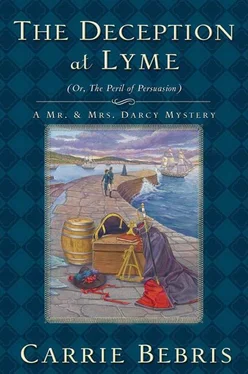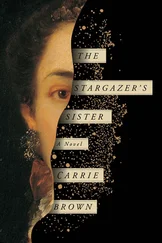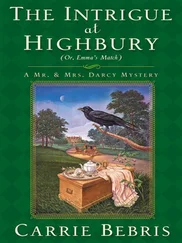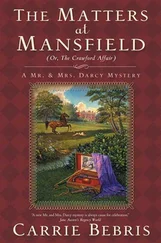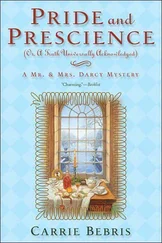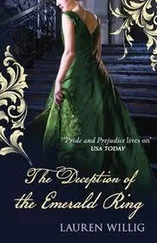“I had seen them together on the Cobb numerous times before, but though they sometimes walked right past my bench, they never saw me—nobody notices a cripple; indeed, passers-by avert their gazes to avoid my eyes—and I am so changed that the two of them never realized how close they strolled to a discarded remnant of their past. I saw them in their fine clothes, saw her belly great with evidence of yet another illicit dalliance, and never did anything to draw their attention as they walked past. Betrayed by them both, I wanted nothing to do with them.
“That morning, they argued, and I learned that their treachery had gone further than I had previously known. Moreover, I learned that Mrs. Clay had left Mr. Elliot and taken up residence with your father. The news angered Mr. Elliot, but it incensed me.” Mrs. Smith’s face contorted in disgust. “She made me ill”—her voice shook—“with her loose ways and string of lovers. There I was, impoverished and alone, my husband dead, no fortune to ease my physical comfort, no children to console me. Privation and poor health were my sole legacy from the careless days of our youth, while she had attained everything she ever wanted.”
She fingered her locket, with its miniature of the late Mr. Smith, and turned to Mr. Elliot. “And you—you sickened me in other ways. Not only have you been living in luxury off a fortune my husband’s property made possible, but you —my ‘friend’—kept another secret from me for so many years.”
“You were happier not knowing,” Mr. Elliot said.
“I suspected. When I asked you directly, you denied any knowledge—I had to learn years later from your wife. However, when I sorted through my husband’s papers after he died, I found a note from you proving that you knew from the start. I tore it to pieces, not wanting any reminder of how thoroughly deceived I had been by everyone around me. Now I wish I had kept it, as further evidence of what a heartless creature you are.”
Mr. Elliot shrugged. “It was not my secret to tell.”
“No, it was my husband’s—and hers.”
Elizabeth realized she had read a fragment of that note, and understood the betrayal Mrs. Smith referred to. The portrait of Mr. Smith in the locket his widow now gripped in her fist depicted a man with red hair—as red as that of Mrs. Clay’s second son.
Mrs. Smith turned back to Anne Wentworth. “If you have not already inferred, Mrs. Clay’s liaisons did not begin and end with naval officers.”
“Oh, Frances…” Anne’s expression softened, and she went to sit beside Mrs. Smith.
While Captain Wentworth attended Mrs. Smith’s speech, he seemed distracted. His gaze strayed repeatedly to the Black Cormorant. Its deck was astir today, though its crew went about their work quietly.
“With my husband no longer able to confess,” Mrs. Smith continued, “I decided to confront Mrs. Clay. I wanted to see remorse in one of them. I wanted to hear the truth from somebody .
“I left my bench and walked to the steps around that bend.” She pointed toward the southern end of the Cobb, where stood the far stairs behind the quay. “By the time I climbed to the top and reached Mrs. Clay, Mr. Elliot had gone.”
Mr. Elliot, too, seemed attentive to the activity aboard the Black Cormorant. His gaze had drifted to the ship, but at the mention of his name it returned to Mrs. Smith.
Captain Wentworth leaned toward Darcy. “She is preparing to make sail.” Only Elizabeth stood close enough to overhear him; Mrs. Smith continued as if he had not spoken.
“Mrs. Clay was looking upon the harbor when I spoke her name. She turned round, and for a moment she did not know me. But then she recognized traces of my former self in my present face. There was no greeting, no warmth of encountering an old friend after a span of years. She only asked what I was doing in Lyme. I replied that I had come for my health. She made no enquiry into how I fared,” she said bitterly, “not even the most minimal civility.
“I, on the other hand, asked after her, and she gleefully announced her new status as Lady Elliot. When I enquired after her boys, she could barely give any account of them—it was clear that they seldom entered her thoughts. The injustice of it overpowered me. Indulged by men of wealth, she had now married one, and would know a life of comfort that surpassed even what she enjoyed during our former years together, neglecting the child that should have been mine even while carrying another.”
Mrs. Smith’s voice cracked, and one of the hands that had been strong enough to carry Alfred now shook as Anne Wentworth took it into her own.
“I asked about her younger son, and whether he had grown to bear the image of his father. She replied that he little resembled Mr. Clay. ‘That is not what I asked,’ I said. She at last had the decency to look ashamed. She took a step back, and said she did not understand my meaning. She was close to the wall’s edge, but not right upon it. ‘That surprises me,’ I said, ‘for I understand you perfectly.’ I moved another step toward her. ‘But if you truly do not comprehend, I will state my query more plainly. Is he my husband’s child?’
“She stared at me for what must have been half a minute at least, the wind whipping her hair and cloak, the gloom deepening. I could see in her calculating visage an internal deliberation over whether any purpose would be served by attempting to maintain the lie any longer. At last she answered. ‘Yes, he is.’
“At that moment, a thunderbolt pierced the sky. Arriving as it did, so swiftly upon her confession, it seemed a divine condemnation of her sin. She started, and took another step backward, coming precariously close to the edge of the seawall. I realized her peril and moved toward her to pull her back to safety. But Mrs. Clay interpreted my advance as threatening, and put up her hands to ward me away.”
Mrs. Smith’s voice had become thick. She swallowed, blinking watery eyes. “I called out to warn her that she was close to the edge, but people were shouting about a ship on fire and my voice was drowned by their cries and the wind. Then the ship exploded. The blast so startled her that she lost her balance. I reached for her, but she was already too far into her fall for my fingers to more than brush her sleeve.”
Mrs. Smith looked beseechingly at Anne.
“It was an accident. An unfortunate, regrettable accident.”
* * *
“Yet you did not summon anybody to help her,” Darcy said.
“My own thinking was not clear immediately following,” Mrs. Smith replied. “I was shocked by the explosion and from the horror of witnessing such a dreadful fall. I assumed Mrs. Clay was dead, having tumbled so far, especially in her condition. Also, I was frightened that someone might have seen the accident and misconstrued what occurred—as Mr. Elliot did. I started walking along the upper wall toward shore, faster than I had realized myself capable of, spurred by fear and the pandemonium around me. I had covered half the distance before my mind settled enough for me to consider that perhaps she had not died. I looked back, and by then you were attending her. So I continued to the main steps, where I met the sedan chair when it and my nurse arrived a few minutes later. She was surprised to find me waiting there, but I told her that after the explosion someone had helped me that far.”
She turned back to Anne Wentworth. “My dear friend, you believe me, do you not? You, who have known me even longer than did Mrs. Clay. As much as I resented her, I did not push her. I could never do such a thing.”
Anne pressed Mrs. Smith’s hand. “Of course you could not.”
Darcy was less certain.
Читать дальше
